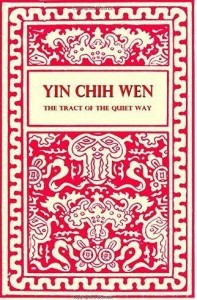
Yin Chih Wen – The Tract of the Quiet Way. It is traditional wisdom of Zen and Chinese Buddhism, insisted upon by Lao Tze and the sages of his school, that the quiet ways of Heaven should be imitated by man. As Heaven lets its sunshine upon good and evil, without discrimination and also without expecting reward or advantages; so man should do good to his fellows, perform acts of rectitude, of justice, and of mercy, show benevolence and kindness toward all in an impartial spirit without cherishing ulterior motives.
The man who thus imitates “Heaven’s quiet way” in realizing the ideal of heavenly goodness is truly virtuous, and so Yin Chih has also come to denote a condition which may be characterized as, and translated by, “secret virtue,” reminding us of Christ’s injunction not to let our right hand know what the left hand is doing (Matt. vi. 1-4).
In the title of the book the words Yin Chih cover the general idea of the “secret ways” both as they are working in the divine dispensation and in human action, and if either meaning predominates we should say that it is certainly the former—the quiet ways of Heaven which determine the destiny of man and which are described by Shakespeare as “A divinity that shapes our ends, Rough-hew them how we will.” —Hamlet, VI, 1-4.
Download the free pdf ebook here:
 Yin Chih Wen – The Tract of the Quiet Way
Yin Chih Wen – The Tract of the Quiet Way


I am certainly not a scholar, but this book is definitely a departure from the traditional Taoist texts in that it is quite pedantic and authoritative in nature. My hunch is it is informed far more by Confucian rather than Taoist thought. I’m reminded of how the 10 commandments differ from how Christ taught, which was through example and storytelling.